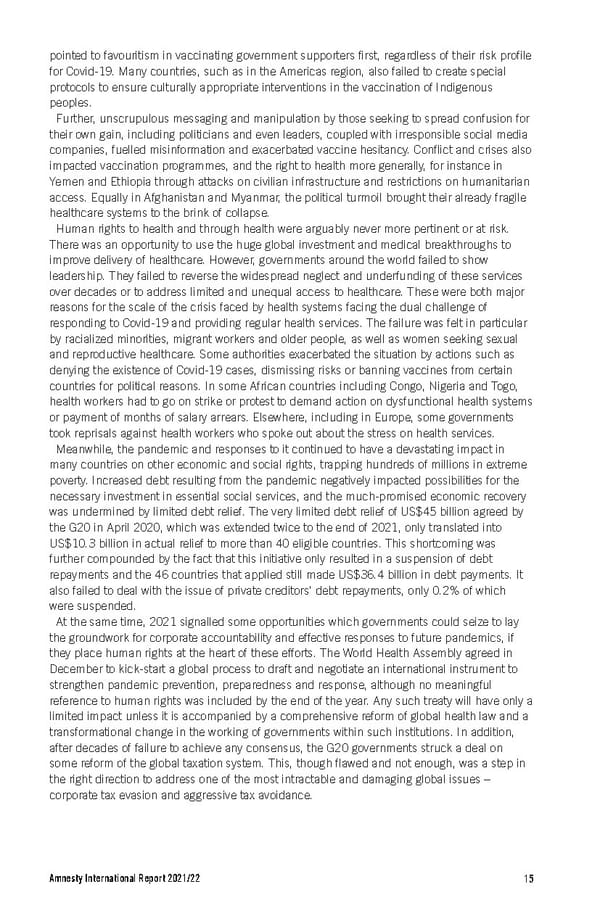pointed to favouritism in vaccinating government supporters first, regardless of their risk profile for Covid-19. Many countries, such as in the Americas region, also failed to create special protocols to ensure culturally appropriate interventions in the vaccination of Indigenous peoples. Further, unscrupulous messaging and manipulation by those seeking to spread confusion for their own gain, including politicians and even leaders, coupled with irresponsible social media companies, fuelled misinformation and exacerbated vaccine hesitancy. Conflict and crises also impacted vaccination programmes, and the right to health more generally, for instance in Yemen and Ethiopia through attacks on civilian infrastructure and restrictions on humanitarian access. Equally in Afghanistan and Myanmar, the political turmoil brought their already fragile healthcare systems to the brink of collapse. Human rights to health and through health were arguably never more pertinent or at risk. There was an opportunity to use the huge global investment and medical breakthroughs to improve delivery of healthcare. However, governments around the world failed to show leadership. They failed to reverse the widespread neglect and underfunding of these services over decades or to address limited and unequal access to healthcare. These were both major reasons for the scale of the crisis faced by health systems facing the dual challenge of responding to Covid-19 and providing regular health services. The failure was felt in particular by racialized minorities, migrant workers and older people, as well as women seeking sexual and reproductive healthcare. Some authorities exacerbated the situation by actions such as denying the existence of Covid-19 cases, dismissing risks or banning vaccines from certain countries for political reasons. In some African countries including Congo, Nigeria and Togo, health workers had to go on strike or protest to demand action on dysfunctional health systems or payment of months of salary arrears. Elsewhere, including in Europe, some governments took reprisals against health workers who spoke out about the stress on health services. Meanwhile, the pandemic and responses to it continued to have a devastating impact in many countries on other economic and social rights, trapping hundreds of millions in extreme poverty. Increased debt resulting from the pandemic negatively impacted possibilities for the necessary investment in essential social services, and the much-promised economic recovery was undermined by limited debt relief. The very limited debt relief of US$45 billion agreed by the G20 in April 2020, which was extended twice to the end of 2021, only translated into US$10.3 billion in actual relief to more than 40 eligible countries. This shortcoming was further compounded by the fact that this initiative only resulted in a suspension of debt repayments and the 46 countries that applied still made US$36.4 billion in debt payments. It also failed to deal with the issue of private creditors’ debt repayments, only 0.2% of which were suspended. At the same time, 2021 signalled some opportunities which governments could seize to lay the groundwork for corporate accountability and effective responses to future pandemics, if they place human rights at the heart of these efforts. The World Health Assembly agreed in December to kick-start a global process to draft and negotiate an international instrument to strengthen pandemic prevention, preparedness and response, although no meaningful reference to human rights was included by the end of the year. Any such treaty will have only a limited impact unless it is accompanied by a comprehensive reform of global health law and a transformational change in the working of governments within such institutions. In addition, after decades of failure to achieve any consensus, the G20 governments struck a deal on some reform of the global taxation system. This, though flawed and not enough, was a step in the right direction to address one of the most intractable and damaging global issues – corporate tax evasion and aggressive tax avoidance. Amnesty International Report 2021/22 15
 Amnesty International Report 2021/22 Page 14 Page 16
Amnesty International Report 2021/22 Page 14 Page 16